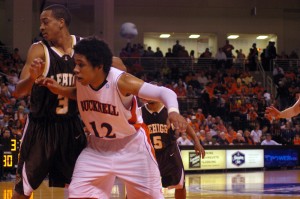By Greg Stevenson
Senior Writer
“One more.”
That was the men’s basketball team’s mantra walking off the court after its grueling, down-to-the-wire victory over Lehigh in the Patriot League semifinal game last Sunday.
Sure, the Bison had used every effort to beat a worthy opponent, an achievement in a season marked by many double-digit victories. But the job they had set out to accomplish on day one, the goal that had been driving them all season, was yet to come. That job was winning the conference tournament and playing in the NCAA Tournament.
“I think a lot of our success has come from our confidence throughout the season,” point guard Darryl Shazier ’11 said. “We have worked very hard since the end of last season to get where we are today, and I think that the confidence in knowing how hard we have worked will get us far and carry us on Friday.”
To finish off the season the way they want, the top-seeded Bison must get through a pesky Lafayette Leopards squad, who came into the tournament ranked sixth in the Patriot League but won some tough games to get to the final. The Leopards upset two top-ranked teams in the opening two rounds of the tournament, the third-seeded Holy Cross in the first round and then second-ranked American in double-overtime in the semis.
History, though, is not on the Leopards’ side. Despite being the first team seeded lower than third to make the Patriot League final, Lafayette also faces the fact that number-one seeds are 49-5 overall in the conference finals.
That said, the Orange and Blue know that history will not be the deciding factor for either side and that it’s about the execution of the ten players on the floor and the schemes that the two head coaches draw up.
“Lafayette has a big low-post presence in Jared Mintz, who is surrounded by great shooters and penetrating guards on the perimeter,” said Patriot League Player of the Year Mike Muscala ’13. “If we take care of the basketball, make hustle plays, and are focused on defense, the offense will take care of itself, and we will be in pretty good shape.”
Defensively for the Bison, the Leopards boast a strong inside game, led by Mintz. But, in both head-to-head match-ups this year, Muscala and Joe Willman ’13 each limited Mintz to less than his scoring average.
In their first meeting of the season, back in mid-January in Sojka Pavilion, the Bison used a 14-2 second-half run to take a four-point halftime advantage and win by a 19-point margin. Muscala, G.W. Boon ’11, and Bryson Johnson ’13 each had 13 points to lead the Bison.
The second time around, on the road, the Orange and Blue played a back-and-forth game with Lafayette all night long. With just four minutes remaining, the Bison opened up an 11-point advantage. But a shocking 11-0 run by the Leopards tied the game and sent it to overtime.
In the extra session, Enoch Andoh ’12 had one of the most clutch stretches of his entire Bison career, scoring two important baskets to take the victory over Lafayette. Johnson also had a career night, recording 30 points and a perfect 11-11 from the free-throw line.
“It helps that we know we can win, but it is always tough to beat a team three times in one season,” Johnson said. “Our last game against Lafayette went into overtime, so we know we have to focus and play well to beat a team like them.”
The 4,000 rowdy Sojka Psychos should expect to see a focused, determined and physical Bison squad on Friday afternoon. This team has been tested all year, with close losses to Villanova, Marquette and Boston College, but also tough wins over most of the Patriot League. If the Bison play up to their potential, a Patriot League championship could be coming to Lewisburg.
